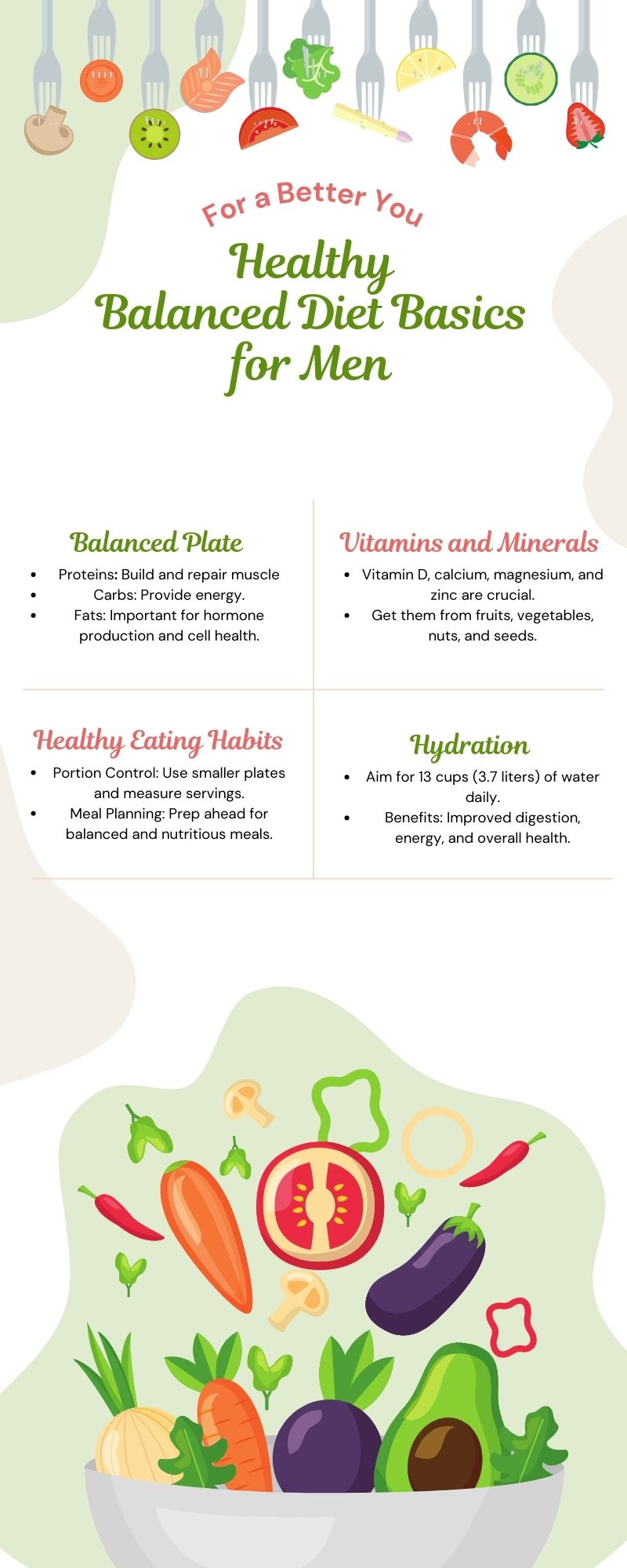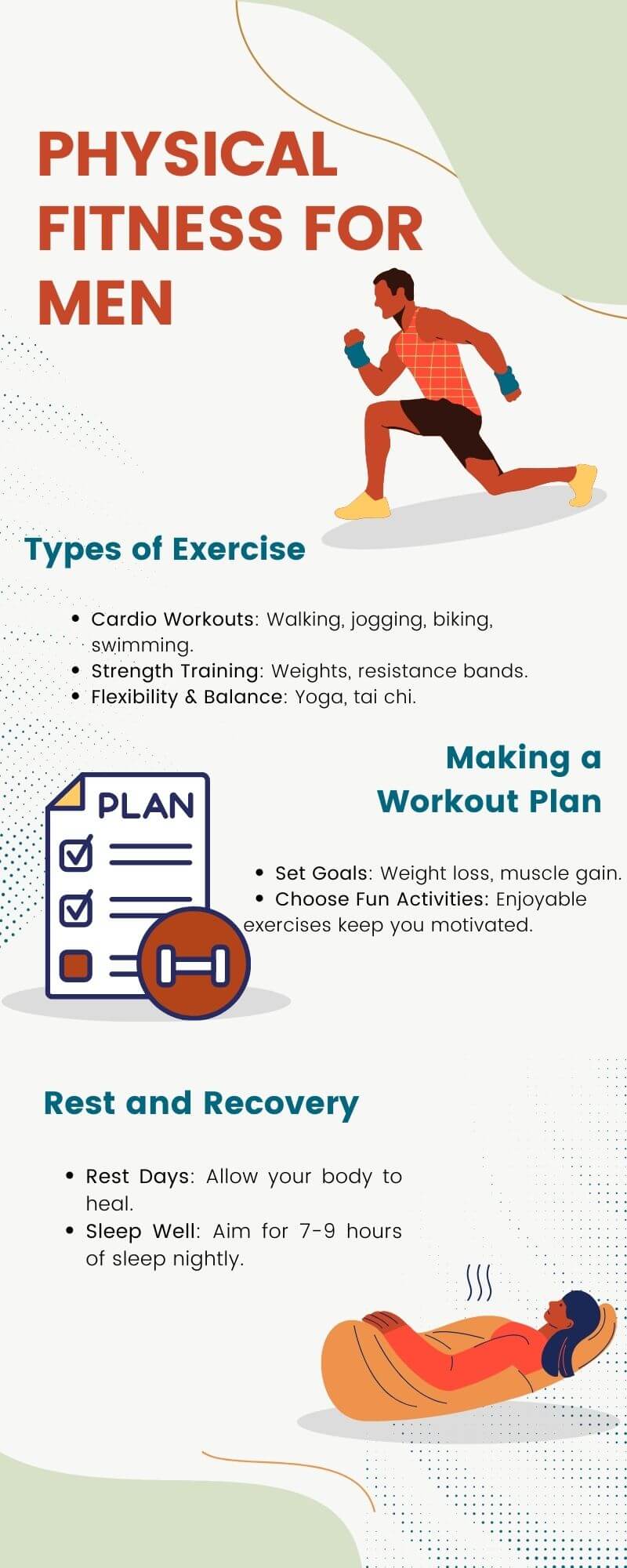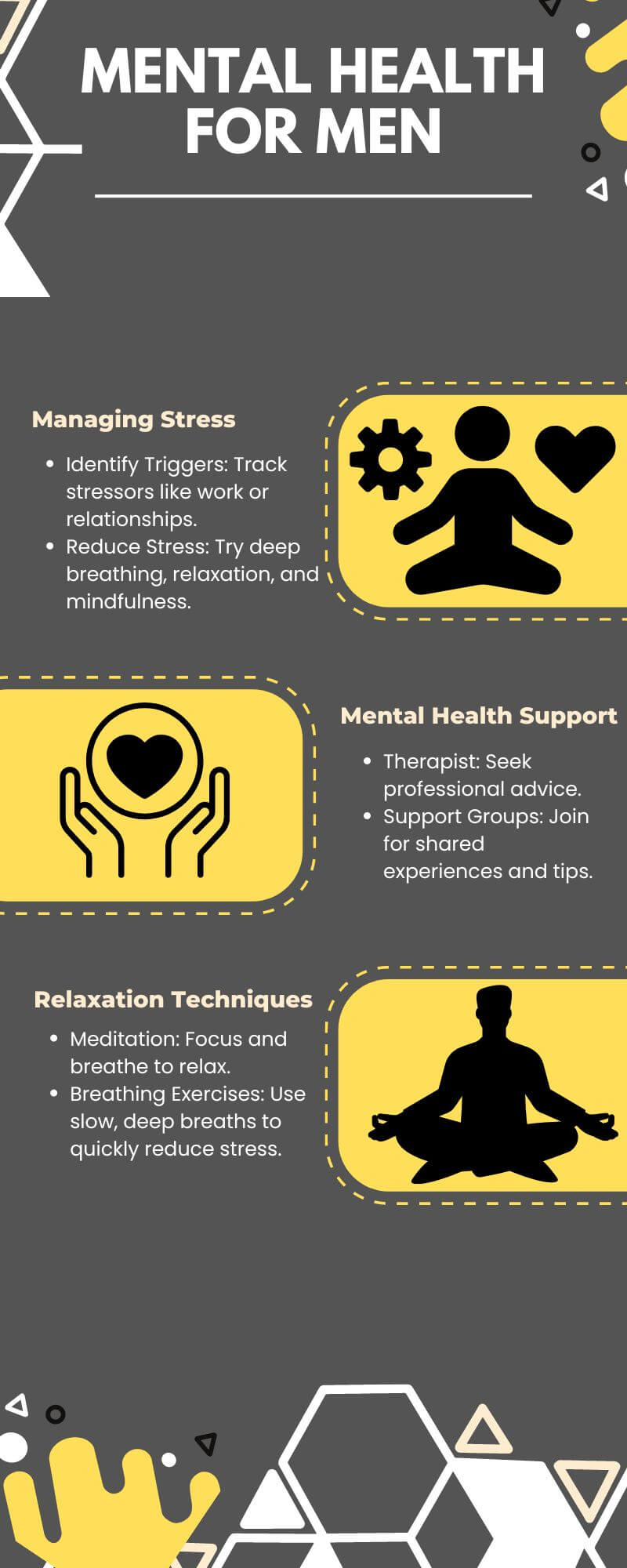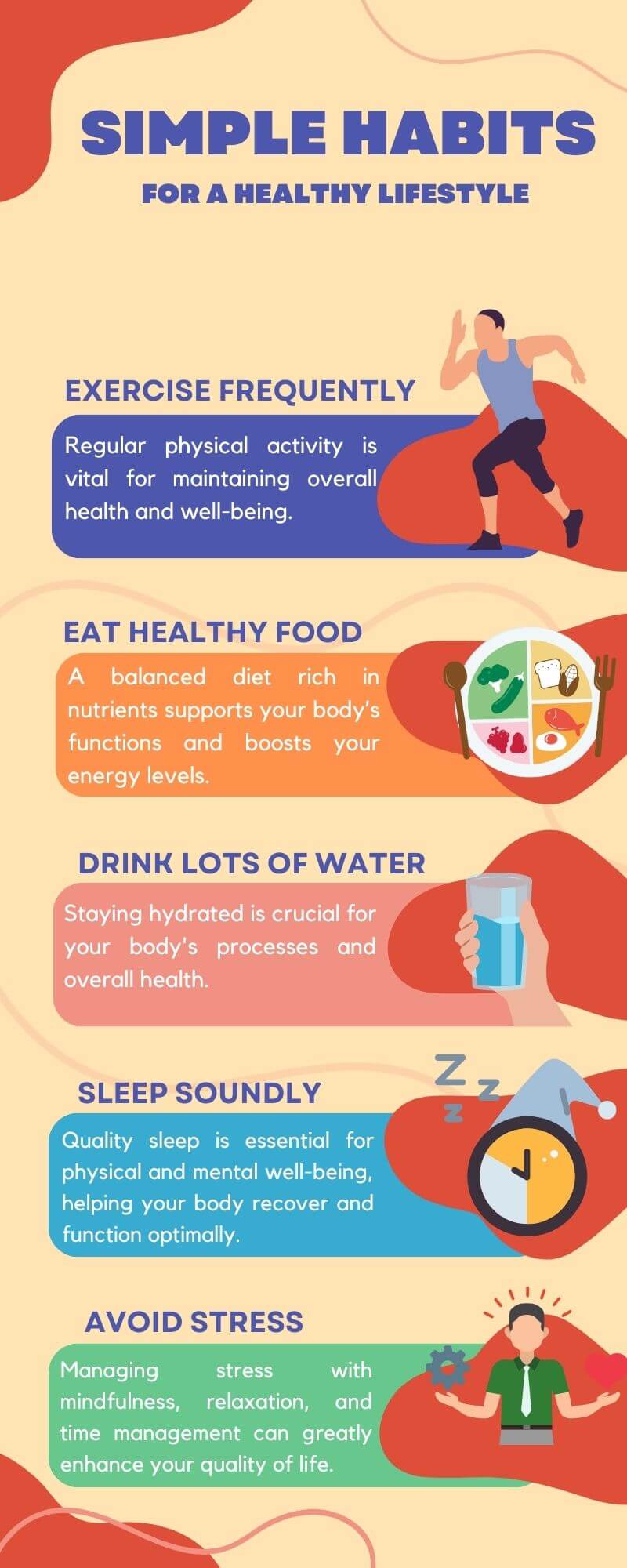In today’s busy world, many men struggle to keep their health in check while managing work, family, and social life. This can lead to ignoring important health needs and facing problems that could have been avoided. The good news is that by following some easy health tips for men, you can greatly improve your overall health and well-being.
Overview of Key Health Areas
It’s important to know and take care of key health areas to prevent long-term illnesses and stay healthy. This article gives health tips for men on important topics like eating right, exercising, mental health, and regular doctor visits. By focusing on these areas, men can make better choices and live healthier lives. And also offer simple solutions to common health issues, helping you stay on top of your health.
Importance of Men’s Health
Taking care of health is very important for men because it helps them live better, longer, and stay productive. Men’s health includes physical, mental, and emotional well-being. When men focus on their health, they can enjoy active lives and handle work, family, and personal activities more effectively.
Let’s Learn Best Health Tips For Men
Nutrition and Diet

Balanced Diet Basics
- Main Nutrients (Proteins, Carbs, Fats): Eating a variety of foods is key to staying healthy. Proteins help build and repair muscles, carbohydrates give us energy, and fats are important for hormone production and cell health. Men should include all these nutrients in their diet to stay fit and active.
- Vitamins and Minerals: Vitamins and minerals are crucial for many body functions, including keeping our immune system strong, maintaining healthy bones, and producing energy. Important ones for men include Vitamin D, calcium, magnesium, and zinc. Eating a range of fruits, vegetables, nuts, and seeds can help get these essential nutrients.
Healthy Eating Habits
- Portion Control: Controlling how much we eat helps maintain a healthy weight. Men can learn to manage portion sizes by using smaller plates, measuring servings, and eating slowly to avoid overeating.
- Meal Planning and Preparation: Planning and preparing meals ahead of time can lead to healthier eating habits. It saves time, reduces the temptation to eat junk food, and makes it easier to stick to healthy eating goals. Planning a week’s worth of meals ensures a balanced and nutritious diet.
Hydration
- Daily Water Intake: Drinking enough water every day is essential for good health. Men should aim to drink about 13 cups (3.7 liters) of water daily, though this can vary depending on activity levels and climate. Staying hydrated helps with digestion, energy levels, and overall body function.
- Benefits of Staying Hydrated: Proper hydration helps transport nutrients, regulate body temperature, and lubricate joints. It can also prevent headaches, fatigue, and kidney stones. Drinking enough water throughout the day can improve both physical and mental performance.
Also Read:
Power of Garlic: Garlic Benefits Men Sexually
Physical Fitness

Types of Exercise
- Cardio Workouts: Activities like walking, jogging, biking, or swimming that boost your heart rate and improve overall fitness.
- Strength Training: Using weights or resistance bands to build muscles and get stronger.
- Flexibility and Balance Exercises: Stretching and balance activities like yoga or tai chi that make your body more flexible and stable.
Making a Workout Plan
- Setting Goals: Decide what you want from your workouts, like losing weight or getting stronger.
- Choosing Fun Activities: Pick exercises you enjoy so you’ll stick with them and stay motivated.
Rest and Recovery
- Taking Rest Days: Give your body breaks to recover and heal. Too much exercise without rest can lead to injuries.
- Sleep Well: Get 7-9 hours of good sleep each night for energy and overall health.
Mental Health

Managing Stress
- Understanding Stress Triggers: Start by figuring out what makes you feel stressed. It could be work pressure, money worries, or problems in relationships. Keeping track of these things in a journal can help.
- Ways to Reduce Stress: Once you know your stress triggers, try methods like deep breathing, relaxing your muscles, or doing mindfulness exercises. Taking breaks and organizing your time better can also help you feel less stressed.
Getting Mental Health Support
- Talking to a Therapist: Sometimes, talking to a therapist can really help. They can listen to your problems and give you advice on how to deal with them. It’s like having a guide to help you through tough times.
- Joining Support Groups: Being part of a group where others understand what you’re going through can be comforting. Whether it’s for anxiety, addiction, or grief, these groups offer understanding and tips on coping.
Relaxation Techniques
- Trying Meditation: Meditation means taking time to focus your mind and relax. It can be as simple as sitting quietly and paying attention to your breath. Doing this regularly can make you feel calmer and more in control.
- Breathing Exercises: Breathing exercises can also help calm your mind. Try taking slow, deep breaths or breathing in a pattern like counting to four as you breathe in, then counting to four as you breathe out. It’s a quick way to relax when you’re feeling stressed.
Preventive Health Care
Regular Check-ups
- Annual Physicals: Men should see their doctor once a year for a check-up. This visit helps catch any health problems early and allows the doctor to check overall health.
- Blood Pressure and Cholesterol Screening: Doctors also check blood pressure and cholesterol levels regularly. High levels of these can lead to heart problems, so it’s important to keep an eye on them.
Vaccinations
- Recommended Vaccines for Adults: Just like kids, adults need vaccines too. Flu shots, tetanus boosters, and other vaccines can protect against serious illnesses. Your doctor can tell you which ones you need.
Cancer Screenings
- Prostate Cancer: Men over 50 should talk to their doctor about prostate cancer screenings. These tests can find cancer early when it’s easier to treat.
- Testicular Cancer: Regular self-checks and talking to the doctor about any changes down there can help catch testicular cancer early.
- Skin Cancer: Keep an eye on your skin, especially if you’ve been in the sun a lot. Any unusual spots or moles should be checked by a doctor.
Healthy Lifestyle Habits
Avoiding Tobacco and Substance Abuse
- Risks of Smoking and Vaping: Smoking and vaping can harm your lungs and make you sick. They can cause problems like lung cancer and heart disease. It’s best not to smoke or vape at all.
- Alcohol Consumption Guidelines: It’s important to drink alcohol in moderation. Men should have no more than two drinks a day to stay healthy and avoid alcohol-related problems.
Safe Practices
- Safe Sex Practices: Using protection during sex, like condoms, keeps you safe from infections and unplanned pregnancies. It’s also smart to get tested for infections regularly.
- Injury Prevention: Be careful to avoid injuries. Wear seat belts when driving, use safety gear for sports, and be cautious around dangerous places.
Social Connections
- Importance of Relationships: Having good relationships with family and friends makes you feel happy and less stressed. It’s important to have people you can talk to and rely on.
- Community Involvement: Getting involved in your community, like volunteering or joining groups, helps you feel connected and gives you a sense of purpose. It’s a great way to meet new people and make a difference.
Additional Health Tips for Men for a Healthy Lifestyle

Age-Specific Health Tips For men
Health Tips for Men (Young 20s-30s)
- Stay Active: Keep moving with regular exercise to stay fit and healthy.
- Eat Well: Have a balanced diet with lots of fruits, veggies, and healthy foods.
- Avoid Bad Habits: Stay away from smoking, too much drinking, and risky behaviors.
- Check-ups: Visit your doctor for regular check-ups and tests.
- Manage Stress: Find ways to relax and handle stress in a healthy way.
Health Tips for Men (Middle-Aged 40s-50s)
- Monitor Health Numbers: Keep an eye on your blood pressure, cholesterol, and sugar levels.
- Stay at a Healthy Weight: Eat right and exercise to keep your weight in check.
- Take Care of Your Heart: Eat less salt, manage stress, and quit smoking if you do.
- Keep Moving: Stay active with exercises that fit your age and health.
- Screenings: Talk to your doctor about tests for cancer, diabetes, and other health issues.
Health Tips for Men (Older 60+)
- Stay Active: Do gentle exercises like walking or swimming to stay mobile.
- Eat Healthy: Focus on good foods like fruits, veggies, and whole grains.
- Prevent Falls: Make your home safe and be careful about balance.
- Stay Social: Keep in touch with friends and family to avoid feeling lonely.
- Watch for Changes: Pay attention to any health changes and tell your doctor about them.
Learn More:
How to Cure Erectile Dysfunction Age 30 to 60 in men?
Special Considerations
Men’s Health Issues
- Erectile dysfunction: Erectile dysfunction (ED) refers to difficulties in achieving or maintaining an erection sufficient for sexual activity. In some cases, ED can be improved or even resolved through natural methods, while in other cases, medication prescribed by a doctor may be necessary. For men with mild or occasional ED, lifestyle changes and natural remedies can often help improve erectile function. These may include:
- Healthy Diet: Consuming a balanced diet rich in fruits, vegetables, whole grains, lean proteins, and healthy fats can support overall cardiovascular health, which is crucial for erectile function.
- Regular Exercise: Engaging in regular physical activity, such as brisk walking, jogging, swimming, or cycling, promotes blood flow, helps maintain a healthy weight, and can improve erectile function.
- Managing Stress: Finding healthy ways to manage stress, such as practicing relaxation techniques like deep breathing, meditation, or yoga, can reduce anxiety and improve sexual performance.
- Limiting Alcohol and Tobacco Use: Excessive alcohol consumption and smoking can contribute to ED. Limiting alcohol intake and quitting smoking can have positive effects on erectile function.
- Improving Sleep: Getting enough quality sleep each night is important for overall health and may also benefit erectile function.
Learn More:
Most effective ways to treat erectile dysfunction
What are the fastest ways to cure erectile dysfunction?
However, for men with severe or persistent ED, especially if it’s due to underlying medical conditions like diabetes, heart disease, or hormonal imbalances, medication may be necessary. These medications, such as sildenafil (Viagra), tadalafil (Vidalista), or vardenafil (Vilitra), work by increasing blood flow to the penis, helping to achieve and maintain an erection.
Sildenafil (Viagra) Usually Prescribed Dosage:
Tadalafil (Vidalista) Usually Prescribed Dosage:
Vardenafil (Vilitra) Usually Prescribed Dosage:
It’s crucial to consult with a healthcare provider before starting any treatment for ED, whether natural remedies or medication. They can assess your specific situation, identify any underlying causes, and recommend the most appropriate treatment plan for you.
- Testosterone Levels: Testosterone is a hormone important for men’s health. Low levels can cause tiredness, low sex drive, and mood changes. Doctors can check testosterone levels and suggest treatments like hormone therapy if needed.
Nutrition and Fitness for Specific Goals
- Weight Loss: To lose weight, eat fewer calories and exercise regularly. Choose healthy foods like fruits, veggies, lean meats, and whole grains. Doing activities that burn calories helps too.
- Muscle Gain: To build muscles, eat protein-rich foods and do strength training exercises like lifting weights or push-ups.
Mental Health Stigma
- Breaking the Silence: Don’t be afraid to talk about mental health. It’s okay to seek help if you’re feeling stressed or down.
- Promoting Open Conversations: Encourage talking openly about mental health. Be supportive and understanding towards those facing mental health challenges.
Conclusion
We’ve covered important aspects of health tips for men, emphasizing check-ups, healthy habits, and mental well-being. Take charge of your health with regular check-ups, healthy eating, exercise, and prioritizing mental wellness. Explore resources like healthcare providers, Men’s Health Network, and Men’s Health Resource Center for more support. Your health journey starts now!




